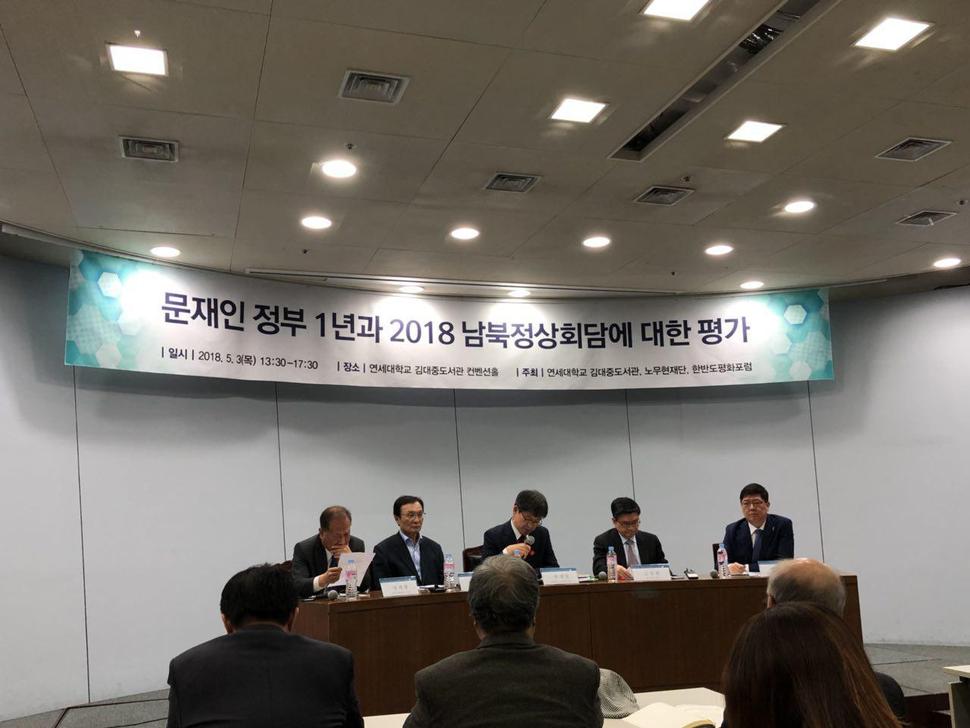 |
|
The participants of Academic conference called “The First Year of the Moon Jae-in Administration and an Appraisal of the 2018 Inter-Korean Summit” held at Kim Dae-jung Library in Yonsei University on May 3. From the left are pictured Jeong Se-hyun, director of the Korea Peace Forum; Rep. Lee Hae-chan, a lawmaker for the Democratic Party; Park Myeong-rim, a professor at Yonsei University and director of the Kim Dae-jung Library; and Kim Hong-gul, chairman the Democratic Party’s Committee for National Unity
|
Excluding China may create “an obstacle to initiating negotiations for a peace treaty”
Amid a debate about whether China needs to join South Korea, North Korea and the US in declaring the end of the Korean War – as South and North Korea agreed to do sometime this year in their Panmunjeom Declaration on Apr. 27 – experts contend that China should be allowed to participate. Since the declaration of the end of the war is the starting point for entering into a peace treaty, they argue, the declaration should be made by all four parties, and not just three. During an academic conference called “The First Year of the Moon Jae-in Administration and an Appraisal of the 2018 Inter-Korean Summit” that was held at Kim Dae-jung Library at Yonsei University on May 3, Jeong Se-hyun, former Minister of Unification and director of the Korea Peace Forum, said that the Blue House’s position that South Korea, North Korea and the US would declare the end of the war on their own “might create an obstacle to initiating negotiations for a peace treaty.” “I assume that the South Korean government’s position is the result of coordination with the US, but it needs to be adjusted if possible. The government needs to rethink whether a declaration of the end of the war would be legally valid if it excluded China, which is a party to the armistice agreement,” Jeong said. “China regards itself as a victim of North Korea’s nuclear program. Therefore, China is working as hard as the South Korean government to resolve the North Korean nuclear issue. China cannot be omitted from a declaration of the end of the war,” said Rep. Lee Hae-chan, a lawmaker for the Democratic Party. The previous day, the Blue House clearly expressed its position that the declaration of the end of the war, as a political event, should be made by South Korea, North Korea and the US, and that the peace treaty, which is an institutional development, should be signed by those three parties along with China. “Since China was one of the parties that signed [the armistice agreement], it ought to be included in the declaration of the end of the war,” said Koh Yu-hwan, a professor at Dongguk University and a member of the advisory committee for the inter-Korean summit, during the academic conference. Koh noted that the push for a trilateral declaration of the end of war “is said to largely reflect North Korea’s intentions.” “I don’t think we need to attribute too much significance [to declaring the end of the war]. It’s basically a political declaration aimed at resolving the hostile relationship,” Koh added. “In light of China’s national interests and China’s role during the Korean War as well as during a peace regime on the Korean Peninsula, it’s unclear whether China would agree [to a declaration of the end of the war from which it is excluded]. We need to be thinking about the pros and cons of excluding China from this political declaration,” said Park Myung-lim, a professor at Yonsei University and director of the Kim Dae-jung Library. Park is an expert on the Korean War. By Noh Ji-won, staff reporter Please direct comments or questions to [english@hani.co.kr]






